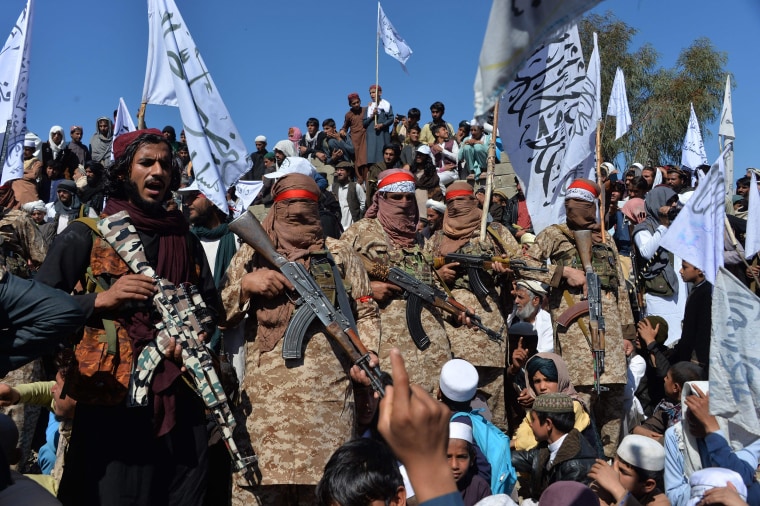Secretary of State Mike Pompeo flew into Kabul on Monday in a bid to resolve a political crisis between two rival Afghan leaders that has threatened to derail peace talks and a planned U.S. troop withdrawal.
Pompeo made the unannounced trip to Kabul even as senior diplomats around the world have dramatically scaled back most international travel due to the coronavirus pandemic.
While in Kabul, the secretary held meetings with Afghan President Ashraf Ghani and his chief political rival Abdullah Abdullah, both claiming to be the legitimate victors in Afghanistan’s September presidential elections. U.S. special representative Zalmay Khalilzad, an experienced diplomat who has led U.S. discussions with the Taliban, greeted the secretary upon his arrival but did not attend the day’s meetings.
“We are in a crisis," a State Department official told reporters traveling with Pompeo. “The fear is that unless this crisis gets resolved and resolved soon, that could affect the peace process, which was an opportunity for this country that (has) stood in this 40-years-long war."
The United States agreement with the Taliban, which was signed last month, “could be put at risk,” the official, who was not authorized to speak on the record, added.
Khalilzad and other U.S. diplomats have tried to resolve the dispute between Ghani and Abdullah in recent weeks without success, and officials hoped Pompeo’s visit would push the two rivals to announce they were joining forces and allow the peace process to resume.
“What we want is President Ghani and former chief executive Abdullah to come to an agreement about how to form an inclusive government that is acceptable to both,” the official said.
The political crisis in Kabul has delayed plans for groundbreaking peace talks between the Taliban and an Afghan-government led delegation. The Taliban agreed to enter into direct talks for the first time as part of a deal last month signed with the United States, which pledged to withdraw American troops from Afghanistan if the insurgents abided by several conditions including breaking ties with al-Qaeda and other terrorist groups.
Under the U.S.-Taliban agreement, discussions between the Afghan government and Taliban were set to begin March 10 but the deadline has come and gone with little forward movement.
Meanwhile, violence by the Taliban against Afghan Security and Defense Forces has continued, with the most recent attack leaving 27 dead, according to the Afghan Defense Ministry.
“This heinous act of the Taliban is a clear example of their commitment for continued violence and against the AFG peace process,” tweeted Sediq Sediqqi, Ghani's spokesperson.
Pompeo’s visit also coincided with efforts by Khalilzad to resolve a dispute over a prisoner swap, which also threatens to undermine the fledgling peace process.
Khalilzad called on both the Afghan government and the Taliban to follow through on prisoner releases to clear the way for direct peace talks between the adversaries, citing the coronavirus outbreak as yet another reason to move quickly. Authorities in Afghanistan put the number of confirmed cases at 34 as of Sunday but due to limited testing and the vulnerabilities in the country’s healthcare system, the actual number is feared to be higher.
“Everyone clearly understands the coronavirus threat makes prisoner releases that much more urgent,” Khalilzad said in a tweet, adding that “all sides conveyed their strong commitment to a reduction of violence, intra-Afghan negotiations, and a comprehensive and permanent ceasefire.”
The two sides spoke on Sunday via a Skype video conference call brokered by the United States and Qatar, Afghan officials and the Taliban said.
“Both sides exchanged options on initial technical steps for the release of prisoners,” the Afghanistan National Security Council said in a statement afterward. The council also said that a reduction in violence, direct peace talks and a permanent ceasefire were also discussed.
A Taliban spokesman, Suhail Shaheen, confirmed the online discussion in a tweet but said the conversation only focused on the exchange of prisoners.
The Afghan government has argued for a phased release of Taliban prisoners based on conditions while the Taliban has insisted on the release of up to 5,000 Taliban members up front as a condition to start direct peace talks.
The proposed prisoner exchange was part of the agreement between the United States and the Taliban signed in Doha last month.
Under the deal, the United States promised to seek the release of up to 5,000 Taliban fighters held by the Afghan government, in exchange for about 1,000 Afghan troops held by the insurgency. But the Afghan government was not a signatory to the agreement, and officials in Kabul are reluctant to hand over prisoners without more firm guarantees from the Taliban that the insurgency is ready to negotiate a genuine peace and halt its attacks.
U.S. officials so far have been unable to resolve the disagreement.

